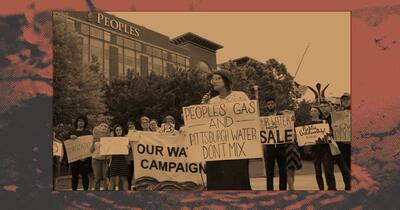
Report: Pittsburgh Water Privatization Caused Lead Contamination, Skyrocketing Costs
"Water is — and always should be — a public good. Cutting corners and endangering the public to deliver profits for a private corporation is the height of greed and disregard for the people’s well-being."

NEW YORK—Demos and Pittsburgh United today released a report highlighting the devastating impact of water privatization efforts and local community organizers’ fight to ensure Pittsburgh’s water is a public good. The water system that serves tens of thousands of Pittsburgh residents — including the City’s majority Black and brown communities — was contaminated with lead from 2014 to 2016, per the report. Contamination, billing, and other service issues led to discussions of privatizing the authority, but the work and organizing of a diverse coalition of local advocates prevented the sale of Pittsburgh’s water to a private corporation.
Read the report — Water as a Public Good: Pittsburgh's Our Water Campaign — here.
In the absence of funding from federal, state, and local governments, the Pittsburgh Water and Sewer Authority (PWSA) turned over day-to-day management of its water to Veolia North America, a transnational for-profit water management firm, in 2012. While Veolia identified $3 million in savings, the funds ultimately resulted in profit for the firm and its consultants rather than direct improvements to the infrastructure system in dire need of repair. In addition to using a chemical that accelerated lead contamination, Veolia cut the number of staff responsible for basic functions like water inspection and account management, which led to threats to public health and widespread billing errors.
“Water is — and always should be — a public good. Cutting corners and endangering the public to deliver profits for a private corporation is the height of greed and disregard for the people’s well-being,” said Daniella Zessoules, senior policy analyst at Demos. “Pittsburgh United’s campaign to stand up and protect water as a human right is an example of the power of community organizing. When the people unite to demand accountability, change is possible.”
Following the city’s failed partnership with Veolia, organizers from Pittsburgh United, a coalition of community, labor, faith, and environmental organizations, developed the Our Water campaign, an effort to mobilize public pressure to prevent future water privatization. From 2017 to 2019, the coalition organized community members to attend PWSA board meetings, give public comments about residents’ needs, and demand that PWSA be kept public.
“The water authority is a democratic institution that provides water to our city, which is a human right. Keeping the authority public allows for public engagement and democratic control,” said Jennifer Rafanan Kennedy, executive director of Pittsburgh United. “We were clear that our water wasn’t for sale.”
Pittsburgh United’s success in organizing and winning a commitment from elected officials to keep water public exemplified the power and reach of community organizing. The Our Water campaign established a playbook for other municipalities, which employed similar tactics in the face of privatization.
Even in light of a successful local effort to safeguard the well-being of Pittsburgh residents, Demos and Pittsburgh United note that there remains a need for reform in Pittsburgh. The groups urge federal lawmakers and Mayor Ed Gainey to take the following actions accordingly:
- Ensure funds from the Infrastructure Investment and Jobs Act go toward replacing all lead pipes in Pittsburgh.
- Ensure a robust community input process.
- Continue the Gainey Administration’s commitment to keep water and other infrastructure in the public realm.
This case study is the first of four Demos reports on economic democracy. The series highlights the ways in which Black and brown people in America can — and should — have greater control over the institutions and economic forces that shape their lives.
###
Demos is a think tank that powers the movement for a just, inclusive, multiracial democracy. Through cutting-edge policy research, inspiring litigation, and deep relationships with grassroots organizations, Demos champions solutions that will create a democracy and economy rooted in racial equity.
Pittsburgh United is a coalition of community, labor, faith, and environmental organizations committed to advancing the vision of a community and economy that work for all people. The coalition aspires to create a community where all workers are able to care for themselves and raise their families, sharing in the prosperity generated by economic growth and development.




